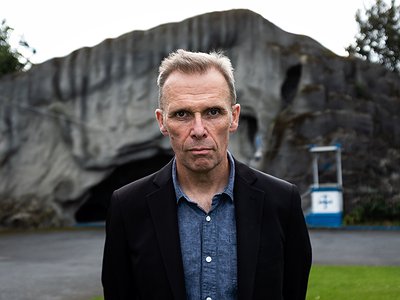Collaborations can take on many forms. What role do they play in your approach and what are your preferred ways of engaging with other creatives through, for example, file sharing, jamming or just talking about ideas?
As for many people, collaborations have become massive for me. The next release after Song Of Co-Aklan will be the first album by the group Telefís, which consists of myself and Jacknife Lee. This was recorded quite spontaneously, with minimal planning.
One of the things which inspires me most, though, is just talking to people who operate in similar areas to me, about the things which inspire them. With music, in particular, this can lead me to hear things which different ears, and that can be game-changing.
One of the occasions I remember most clearly when this happened was in late 2001 in France, when I was staying in a kind of 16th-century theatre digs in the town of Niort. The video artist who worked in the production in which I was also working had a CD playing on a boombox when I came into the kitchen for breakfast. The song playing was Psaume 151 by Leo Ferré. In that leisurely context, its intensity stopped me dead in my tracks, changed a lot of things for me.
Take us through a day in your life, from a possible morning routine through to your work, please. Do you have a fixed schedule? How do music and other aspects of your life feed back into each other - do you separate them or instead try to make them blend seamlessly?
I don’t, I’m afraid, have a fixed schedule. I’m juggling a lot of things these days, and it’s a case of whatever’s clamouring loudest getting the lion’s share of the time. I know this isn’t sustainable, and I’ll have to get organised again before the Summer.
I rise around 6:30, and always make some time for exercise during the day or evening, either yoga or a run.
Can you talk about a breakthrough work, event or performance in your career? Why does it feel special to you? When, why and how did you start working on it, what were some of the motivations and ideas behind it?
This would have to be the first trip I made to France (referred to above) to work with Francois Ribac and Eva Schwabe’s company in 2001. Instead of touring with a rock band, I was part of a large cast meticulously rehearsing all aspects of a multimedia show in which I was simply one of the singers (who also needed to act, just a little). It began with some sound files which Francois emailed to me and led to a sequence of four productions stretching through the following decade and beyond.
It taught me that I could be ‘just’ the singer again, but that with such beautifully-constructed material to work within, this was more than enough. I just needed to consider my delivery, and ensure I was in shape to execute it.
There are many descriptions of the ideal state of mind for being creative. What is it like for you? What supports this ideal state of mind and what are distractions? Are there strategies to enter into this state more easily?
The most effective strategy I know of is to ensure that no day goes by without an attempt at creativity, whether that’s noodling in some music app on your phone (I’ve obtained several songs from that) or playing about with some words, or the whole nine yards of a song.
The ideal state of mind is when all of reality appears taken care of, and the moment is a world entire to itself. It’s as close as we pathetic primates can come to eternity.
Key and tireless distractions include ill-health and email conversations on important topics which refuse to end.
Music and sounds can heal, but they can also hurt. Do you personally have experiences with either or both of these? Where do you personally see the biggest need and potential for music as a tool for healing?
I only have experience of the healing, I believe. At times when I’ve run my life into the wall, it’s often been the case that only a quiet moment with a piece of music – perhaps something unexpected on the radio – gives me an opening in the cacophony.
I’ve seen how music can help people with serious illness to adjust to their circumstances. But of course this depends on the nature of the illness. Nonetheless, that’s a comfort I’d like when my time comes.
There is a fine line between cultural exchange and appropriation. What are your thoughts on the limits of copying, using cultural signs and symbols and the cultural/social/gender specificity of art?
I don’t really have a fixed position on this. I’ve often been a bigot on the subject of the white vocalist flaunting non-existing gospel chops in order to ‘validate’ some vanity of theirs. That’s still not something which I can bear. But without an element of pretence and fakery, where would we be?
David Bowie once jokingly batted aside an admission of overt ‘influence’ from a musician admirer with the aphorism, “You can’t steal from a thief, darling”. I think there’s a lot in that.
Even varieties of music such as English, Scots or Irish folk music owe much of their modern-day survival to the adoption of ‘inauthentic’ elements. In Irish music, there’s the 1960’s arrival of the bouzouki and other string instruments from the Balkans and Greece, and the popularity in the modern Irish traditional canon of the Penguin Café Orchestra’s Music For A Found Harmonium – itself acquiring its harmonic character, so appealing to Irish musicians, because the PCO’s Simon Jeffes, the composer, found a harmonium on a skip which had some notes missing and went home to write a tune on it.
The diversity of women’s expression in today’s music is a big improvement on circumstances my youth, and it’s no longer simply derived from men’s experiences and perceptions.
There isn’t one dominant genius figure like Joni Mitchell at the moment, but it’s become ridiculous to pre-judge music as having a certain character simply because it’s composed or performed by a woman. It always was somewhat the case in my lifetime (thinking of Annette Peacock, Julie Tippetts, Dagmar Krause, Dorothy Ashby, Karen Dalton, and many others), but now is wholly so.
Our sense of hearing shares intriguing connections to other senses. From your experience, what are some of the most inspiring overlaps between different senses - and what do they tell us about the way our senses work?
I’m a bit of a plank in this department. Having one’s chest cavity vibrated by some dubwise bass is certainly a great thing, and I think that’s to some extent due to fear of consequences for the body, and the consequent release of adrenalin. Maybe?
Art can be a purpose in its own right, but it can also directly feed back into everyday life, take on a social and political role and lead to more engagement. Can you describe your approach to art and being an artist?
I see myself as a pawn who roared a bit. I admire, but somewhat envy, those who have found a way to weave their creative work into the everyday life of their community – I’m thinking of someone like Charles Hayward (drummer, vocalist, arranger with This Heat, Camberwell Now, etc.), who exemplifies this. Somehow, it hasn’t happened for me. Life isn’t over yet, perhaps chances will present themselves. But the work I make is so ridiculous, and rather hermetic …
What can music express about life and death which words alone may not?
I think that’s out of the music creator’s hands, I honestly do, and it’s very much in the mind of the listener. Even in classical music, which is so bound up in the pursuit of this wordless significance, one person’s heartbreaking crescendo (for example) is another person’s chintzy bombast.
There are many moments in Scott Walker’s late-period work which do sound to me as though they come from outside of time – e.g. the intro to Farmer In The City, Rosary or the whole of Sleepwalkers Woman. But I know not everyone agrees. I’m sure he was aiming for something like that, but we just don’t get to choose the reception.



